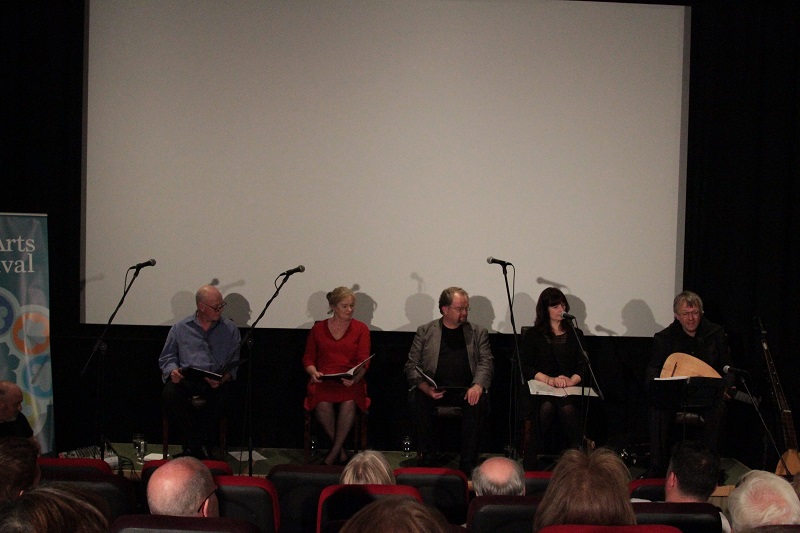Rye’s Art Festival closed at the Kino cinema on Sunday September 27 with an evening of music and words from John Fletcher, Rye’s most famous son. These were performed by the English Ayers, musicians dedicated to performing early music as well as soprano Jeni Melia and Chris Goodwin, who sings and plays the lute, were joined by three actors for the performance in front of the cinema screen.
Fletcher was the son of the local vicar and was born in 1579. He went on to be a famous playwright with the country’s premier theatrical company, The King’s Men. He collaborated with Shakespeare, Middleton, Beaumont and others and also wrote at least 16 solos. Plays at this time included a song or two and many of Fletcher’s plays have survived with their original music.
The show was a celebration of John Fletcher’s songs and plays with a cast comprising Chris Goodwin (lute, theorbo – another sort of larger lute – and narrator), Jeni Melia (soprano) and three actors Hugh Kermode, Patience Tomlinson and David Timson. The show opened with a song from the lost play Cardenio from 1613, believed to be a collaboration with Shakespeare.
Next came The Mad Lover, a Fletcher play first performed in 1617. It is set in the Court of King Astorax in Paphos. The great general Memnon returns home and falls for the king’s sister, the beautiful Princess Calis. The general has no experience of the ways of love. Calis suggests that he gives her his heart.
He takes the suggestion too literally and makes plans to have his heart cut out and presented to her. The play gets very convoluted at this stage with a fake heart presented to Calis by Memnon’s brother Polydore. Calis falls in love with Polydore. Various songs are interspersed with the action. In the end Cali marries Polydore and Memnon promises to be her champion.
The third play was Valentinian. The Roman emperor Valentinian is corrupt and decadent. Valentinian lusts after the wife of a solder Maximus, Lucina. Valentinian rapes her. The body count begins to rise as Lucina commits suicide, the emperor is poisoned and the poisoner kills himself. Maximus plans suicide, but the army appoints him emperor.
To secure his reign, Maximus marries Valentinian’s widow, Eudoxia. In his cups, he tells how he plotted Valentinian’s death. Eudoxia poisons Maximus and the soldiers are going to kill her, until she reveals Maximus’ plotting. They let her live and vow to elect a new Caesar “above the reach of envy, blood and murder”.
The next play was The Captain, which concerns two nice girls and one very bad girl. The good girls get their men, but the bad girl tries to sleep with her father. That was too much for everyone, and she is carried off and married to a tiresome fop.
The final play was another tragedy, The Bloody Brother. It deals with tyranny, this time in early medieval Normandy. The Duke of Normandy has two sons, the elder Rollo and younger Otto. On his deathbed the Duke decrees that they should rule together. Civil war is almost declared until their mother Sophia pleads with them to abide by their father’s dying wish to which they agree.
Rollo’s evil councillor Latorch persuades him to do away with his brother. There is to be a celebration banquet so Latorch goes to the kitchen and induces the cooks to poison all Otto’s favourite dishes. Otto finds out, eats nothing and goes to tell his mother what has happened. Rollo now appears and kills his brother.
It all goes downhill from here as the body count mounts again, the action is interspersed with songs, but this was a very entertaining evening to round off the Rye Arts Festival with an insight into one of our heroes.
Photo: Ray Prewer



